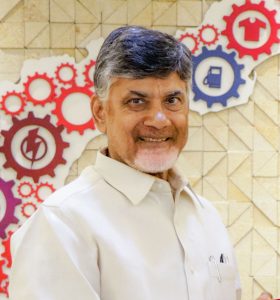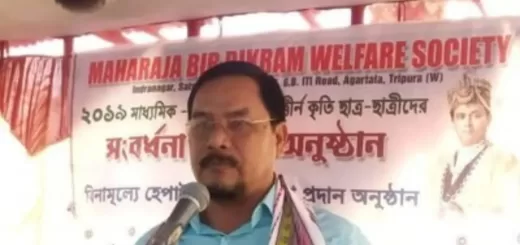Chandrababu Naidu: ‘CEO’ CM who superseded his famous father-in-law

Khevna.P.Shah, INN/Bangalore
@Shahkhevna1, @Infodeaofficial
Chandrababu Naidu was born to a farming family in a small village near Tirupati in Andhra Pradesh. He was initiated into politics during his school days at Sri Venkateswara University College of Arts in Tirupati, from where he received a bachelor’s degree in 1972, and he continued with postgraduate studies at the different university. He then joined the Indian National Congress, and in 1975–77, during the period of emergency rule imposed by then prime minister Indira Gandhi, he served as the local youth president of the party. He subsequently discontinued his studies to pursue a career in politics.

Naidu became a confidant of Sanjay Gandhi, Indira’s eldest son, and in the year 1978 he ran for and was elected to a seat in the Andhra Pradesh state legislative assembly. While serving in office,(1980-83) he also was a minister in the state cabinet.
During that period he married the daughter of Nandamuri Taraka Rama Rao (NTR), a superstar in Telugu industry and founder of the TDP who served three terms as chief minister of Andhra Pradesh. Just a decade after joining TDP, Naidu staged a coup against his father-in-law, wrested control of TDP and became the chief minister.
After Naidu’s revolt, NTR had said his son-in-law’s days of pre-eminence were numbered and he would seek his revenge. In his last interview, NTR compared himself to Shah Jehan, a 17th-century Mogul emperor who was imprisoned by his son, and predicted that he would gain his revenge against what he called “the backstabbers” in his family, especially his son-in-law and successor as chief minister, Naidu.
Naidu soon gained the confidence of NTR, especially following his role in helping to impede the Congress Party attempt to oust NTR from his post as chief minister in 1984. Naidu became general secretary of the TDP in 1985 and was instrumental in building up an effective party organization. Although Naidu did not hold a portfolio in NTR’s government when it was in power, he came to wield considerable clout within the party. When the TDP was out of power (1989–94), Naidu served as party coordinator, skillfully handling its opposition role in the state assembly. His work during that phase was a key factor in the subsequent success of the TDP in the state elections of 1994.
In the September–October 1999 Lok Sabha elections, the TDP improved , gaining 29 seats and consolidating Naidu’s reputation as a leader of significance. He lent his party’s support to the Bharatiya Janata Party (BJP)-led National Democratic Alliance coalition that governed the country between 1999 and 2004. Also in October 1999 he was reaffirmed in his tenure as chief minister, riding the crest of the TDP’s parliamentary and state electoral success.
By that time, Naidu was viewed as an up-and-coming figure in national politics and a future candidate for prime minister. Known for his political acumen and zeal for reform, he was an efficient administrator and policy maker who saw his role as being more like the head of a corporation than a chief minister. Appreciated for his dynamism and willingness to experiment, he accorded priority to good governance and infrastructure development and exhibited the will to invigorate the economic climate of the state. In particular, Naidu’s emphasis on the development of information technology helped transform Andhra Pradesh’s capital, Hyderabad, into one of India’s most attractive destinations for new investment.
Chandrababu Naidu remained a national and international figure, but his attempts to reform disillusioned large groups of voters in Andhra Pradesh, especially farmers and the poor who did not get any advantages from his programs. The TDP was defeated in 2004 national parliamentary and state elections, even though it was still allied with the BJP, Naidu stepped down as chief minister. Again spearheading the opposition in state politics—though now as party leader—he dropped his ties with the BJP and forged an alliance between the TDP and smaller state parties to contest the 2009 national and state elections. That attempt failed, however, as the party made no real gains in either the Lok Sabha or the state assembly. Naidu did retain his assembly seat.
In the spring of 2014, State assembly elections were held just prior to the creation of Telangana state in June out of the northwestern portion of Andhra Pradesh. The TDP again allied itself with the BJP and won a plurality of seats. That plurality became a clear majority when the newly configured Andhra Pradesh assembly convened in June. The TDP formed a government, with Naidu as chief executive. After the party’s poor results in the 2019 general elections, he stepped down as chief minister of Andhra Pradesh.




